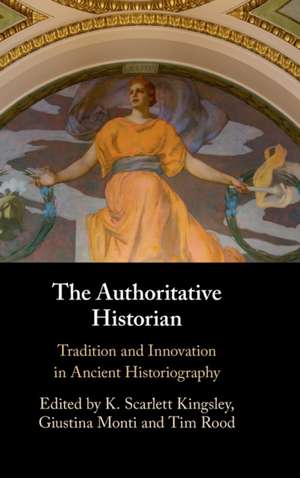The Authoritative Historian: Tradition and Innovation in Ancient Historiography
Editat de K. Scarlett Kingsley, Giustina Monti, Tim Rooden Limba Engleză Hardback – 25 ian 2023
Preț: 732.73 lei
Preț vechi: 805.20 lei
-9% Nou
Puncte Express: 1099
Preț estimativ în valută:
140.20€ • 146.39$ • 116.04£
140.20€ • 146.39$ • 116.04£
Carte tipărită la comandă
Livrare economică 04-18 aprilie
Preluare comenzi: 021 569.72.76
Specificații
ISBN-13: 9781009159456
ISBN-10: 1009159453
Pagini: 400
Dimensiuni: 152 x 229 x 27 mm
Greutate: 0.82 kg
Editura: Cambridge University Press
Colecția Cambridge University Press
Locul publicării:Cambridge, United Kingdom
ISBN-10: 1009159453
Pagini: 400
Dimensiuni: 152 x 229 x 27 mm
Greutate: 0.82 kg
Editura: Cambridge University Press
Colecția Cambridge University Press
Locul publicării:Cambridge, United Kingdom
Cuprins
Introduction: the authoritative historian K. Scarlett Kingsley, Giustina Monti and Tim Rood; Part I. Myth, Fiction, and the Historian's Authority: 1. Seven types of fiction in the Greek historians Michael A. Flower; 2. Folktale and local tradition in Charon of Lampsacus Nino Luraghi; 3. Mythical and historical time in Herodotus: Scaliger, Jacoby, and the chronographic tradition Tim Rood; 4. Myth and history in Livy's preface A. J. Woodman; Part II. Dislocating Authority in Herodotus' Histories: 5. Herodotus as tour guide: the autopsy motif Scott Scullion; 6. Interpretive uncertainty in Herodotus' Histories Carolyn Dewald; 7. 'It is no accident that…': connectivity and coincidence in Herodotus Richard Rutherford; 8. Through barbarian eyes: non-Greeks on Greeks in Herodotus Deborah Boedeker; Part III. Performing Collective and Personal Authority; 9. Singing and dancing Pindar's authority Lucia Athanassaki; 10. Authority, experience, and the vicarious traveller in Herodotus' Histories K. Scarlett Kingsley; 11. Veni, vidi, vici: when did Roman politicians use the first-person singular? Harriet Flower; 12. Self-praise and self-presentation in Plutarch Frances B. Titchener; Part IV. Generic Transformations: 13. Thucydides' Mytilenaean debate: political philosophy or authoritative history? Paul Cartledge; 14. Tradition, innovation, and authority: Caesar's historical ambitions Kurt A. Raaflaub; 15. Tradition and authority in Philostratus' Lives of the Sophists Ewen Bowie; Part V. Innovation within Tradition: 16. 'When one assumes the ethos of writing history': Polybius' historiographical neologisms Giustina Monti; 17. How tradition is formed: from the fall of Caesar to the rise of Octavian Mark Toher; 18. 'Burn baby burn (disco in Furneaux)': Tacitean authority, innovation and the Neronian fire (Annals 15.38–9) Rhiannon Ash; 19. The authority to be untraditional Christopher Pelling.
Descriere
A series of essays exploring tradition and innovation across the full temporal range of Greco-Roman historiography.
